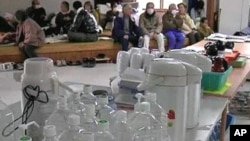Natural disasters typically trigger an outpouring of monetary and in-kind support from Americans. But a week after the deadly earthquake and tsunami in Japan, some U.S. non-profit groups say donations are slow in coming.
Emergency workers are still pulling bodies from beneath the tangle of debris . Survivors crowd makeshift shelters as snow blankets the destruction outside.
Water, food and fuel are scarce.
"We get one bowl of soup or one piece of bread to share among three people, and a few snacks," said one Japanese woman. "We rarely get white rice, so I'm a little concerned about my daughter not getting enough nutrition. But it's better than not eating at all."
International aid efforts are underway. But donations from Americans lag, compared to earthquake relief for Haiti last year.
"My understanding is Japan is a very wealthy country so it hadn't really crossed my mind that they would need donations," one American man said.
Another American said, "It just didn't occur to me because their government is equally as powerful as the United States."
But survivors say they don't have enough now.
"What we're lacking most is water, and vegetables. We need vitamin C," according to one survivor. "Going to the bathroom is a major problem, too."
Mari Kuraishi is trying to help. She has family in Japan and her organization, the Washington-based GlobalGiving Foundation, has raised more than $1 million to help victims.
"In light of the fact that Japan is rich and is organized and has a lot of resources of their own, it’s still amazing to me that as many people have responded," she said.
After disaster struck Japan, Americans donated some $64 million in five days, compared to $210 million for Haiti, according toThe Chronicle of Philanthropy .
But relief efforts are just getting started.
From all angles, we are seeing that people want to help," said Floyd Mori, who heads the Japanese American Citizens League. "Some are going to be short term cash donations, but in the long term we’ll stay involved."
Kuraishi says many aid groups, including hers, only accept money.
"It’s literally a click to send financial resources from here to Japan," she said.
Calls to Japan are free using some phone companies in the United States. And on social-networking sites, people worldwide are offering places to stay.
"The Japanese people, that follow me, turn around to me to say, ‘It’s just so heartening to know that people care. Just to know that people are willing to extend a helping hand,'" said Kuraishi.
An estimated half a million people in Japan are homeless. Thousands are still missing.




